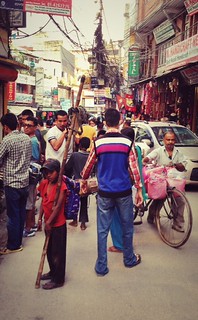Home in America, I’m often struck by the lack of children. Not that I never see children at all, but there are times I can go days without seeing them. The park across from my apartment in Medford, Massachusetts often sits quiet and empty. Last Halloween, I think I only had six trick-or-treaters knock on my door. This shouldn’t be much of surprise since America’s birth rate has declined over the years, but every time I pass a quiet park, I feel a certain loss.
In Kathmandu, there are children of all shapes and sizes wherever I go. At least ten children live in the house next door to me, and every evening when I walk home from CONCERN, they all run up to me and shout, “Namaste!” After a good rain, I often see children jumping around and playing in puddles or splashing in rain runoff. At about 4:00 pm I see swarms of children pass by CONCERN’s offices, all dressed in school uniforms: the girls in navy blue skirts and sky blue shirts, the boys wearing navy pants and sky blue shirts, and all of them wearing perfectly knotted ties. They are laughing and cheerfully walking home. Sometimes the girls will be holding hands, and the boys will either be locked arm-in-arm, or have their arms tossed over the shoulders of their friends.
But if I look closer, past the giggles and the splashes and the playing, I see the other children: the child laborers. I wouldn’t notice them if I weren’t looking for them. A few times a day, I will see a child duck behind a house or down a side street, and it’s obvious that the child is in the middle of a very long work day. Yesterday I was in Thamel, buying groceries and grabbing dinner, and I saw a girl walk out from behind a restaurant carrying a metal container of potatoes. She was about eight-years old. It was wet in Thamel Saturday, and she was trying to jump over puddles and was having a hard time of it.
Also in Thamel, I saw children who looked very much like they lived on the street. Two boys in particular looked the worse for wear. They were tiredly walking along the street. One was carrying a drum, and the other a long pole a bit over six feet long. One boy stopped to look at something on one of the vendor tables, and people just walked past him as if he weren’t there. I feel at a loss for what to do in situations like that, and I wish I knew more than a few words of Nepali. Then I think, the best thing I can do is the work that I’m doing. I hope that soon, the efforts of the many people working to end child labor in Nepal come to fruition.
Posted By Katerina Canyon (CONCERN)
Posted Jul 21st, 2014



1 Comment
Karin
August 6, 2014
I love how you juxtapose the playful behaviour of children with the grim reality that there are still child laborers in Nepal. From jumping over puddles playfully to avoiding wet feet while carrying a heavy pot of potatoes. It is astounding that both scenarios can coexist steps away from eachother. This makes the work of CONCERN all the more relevant in Nepal.